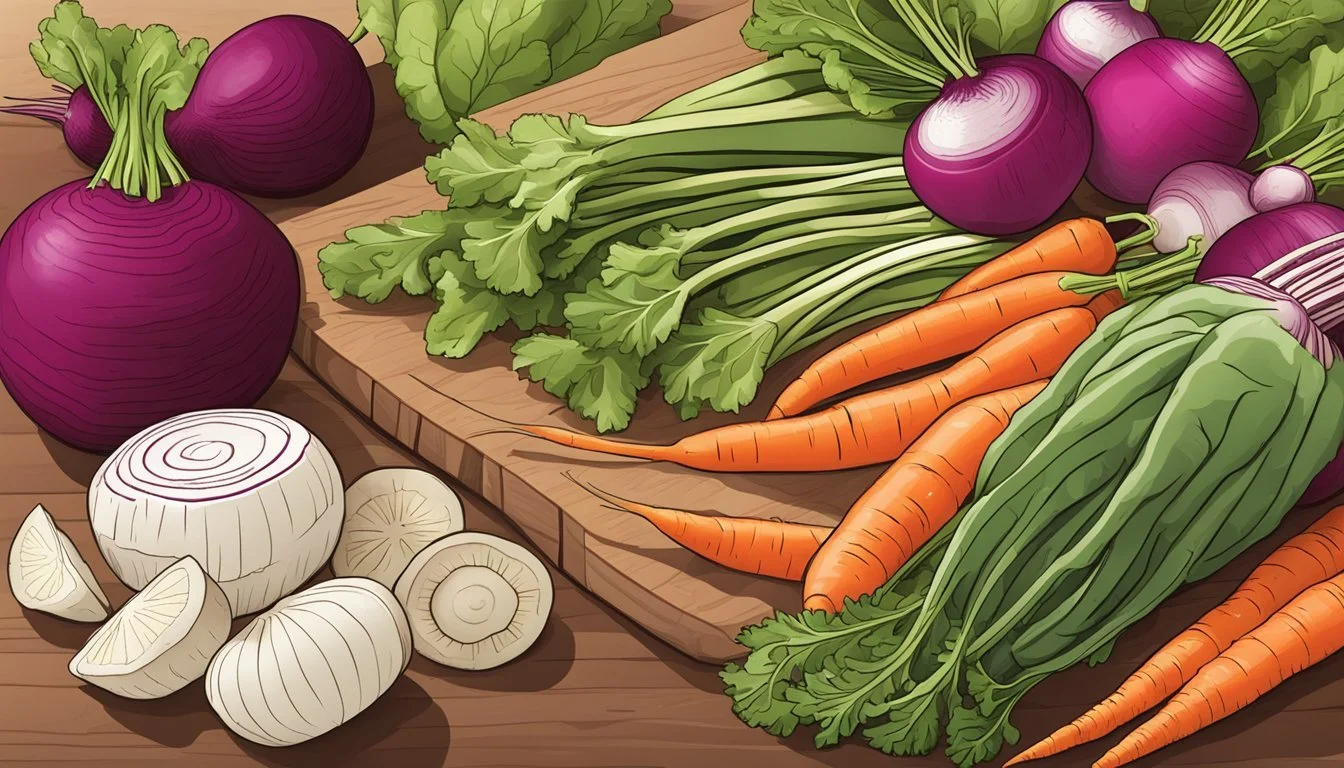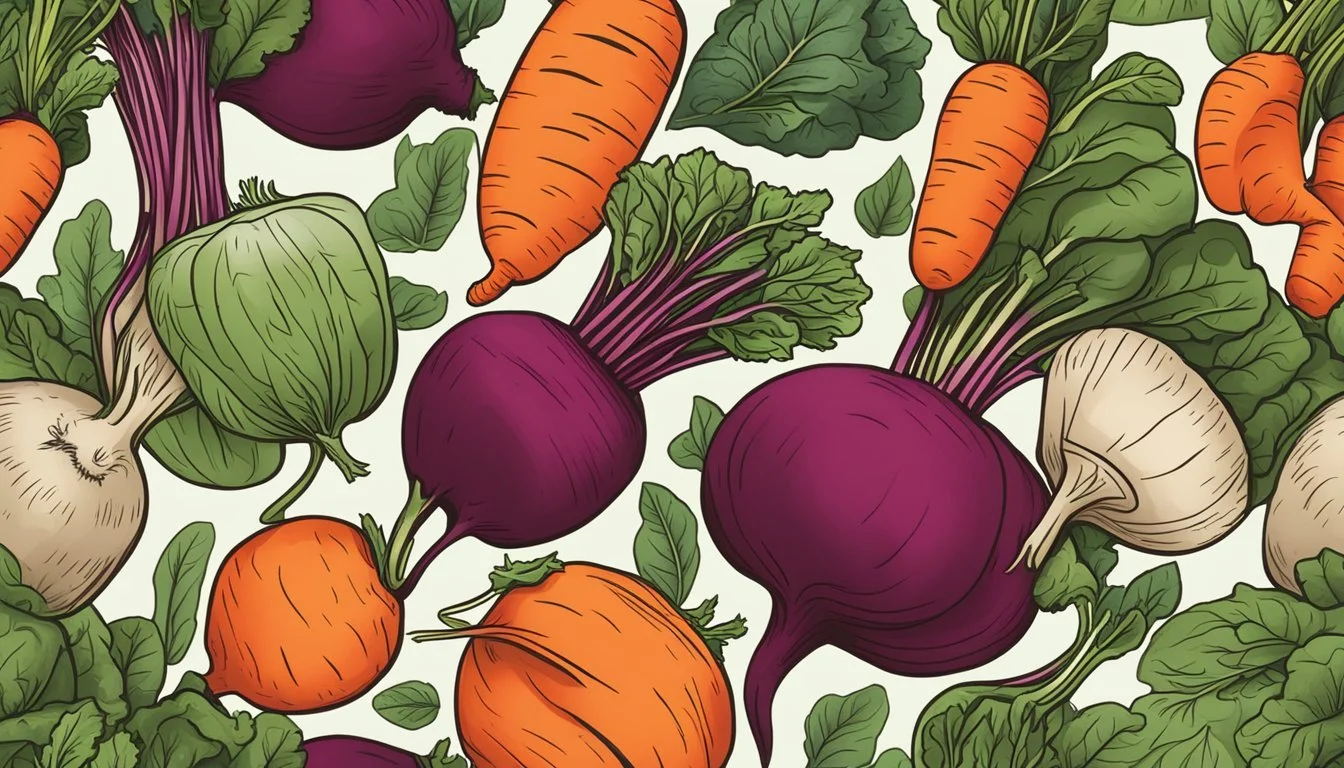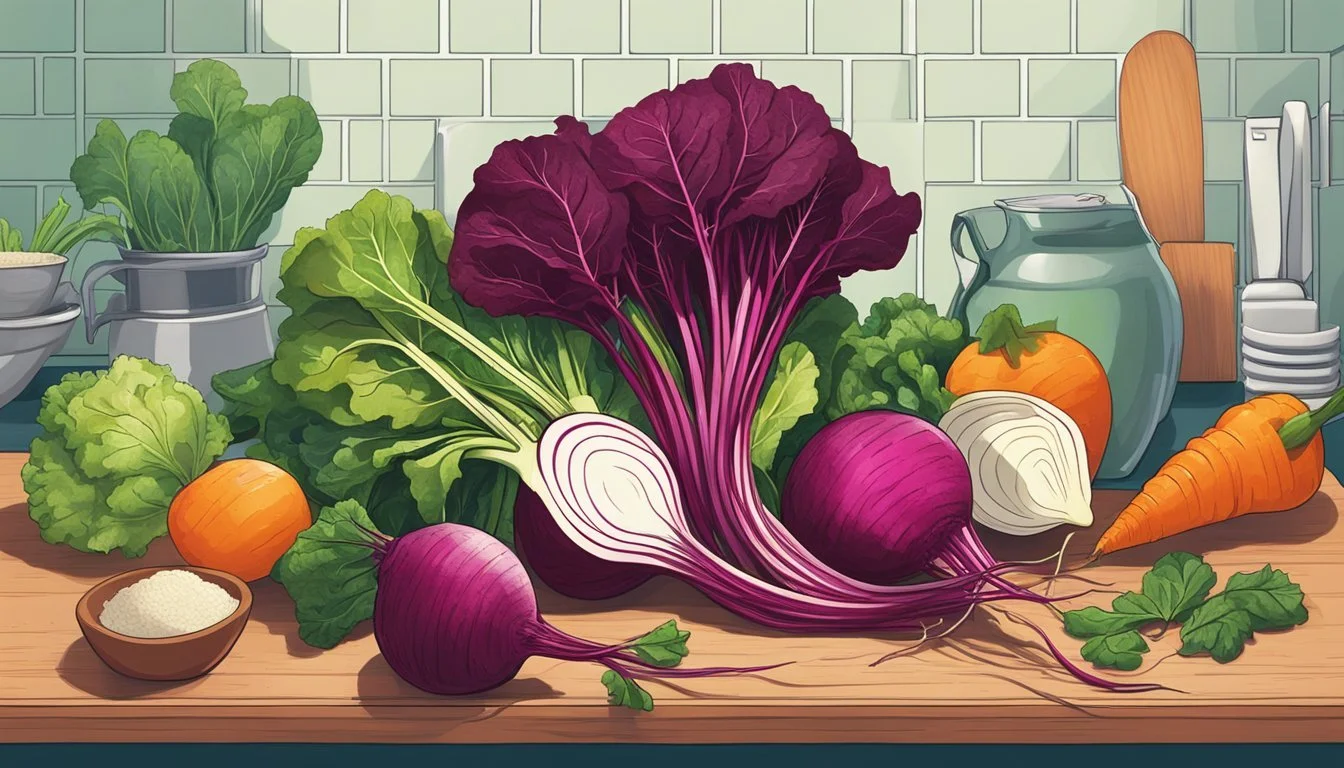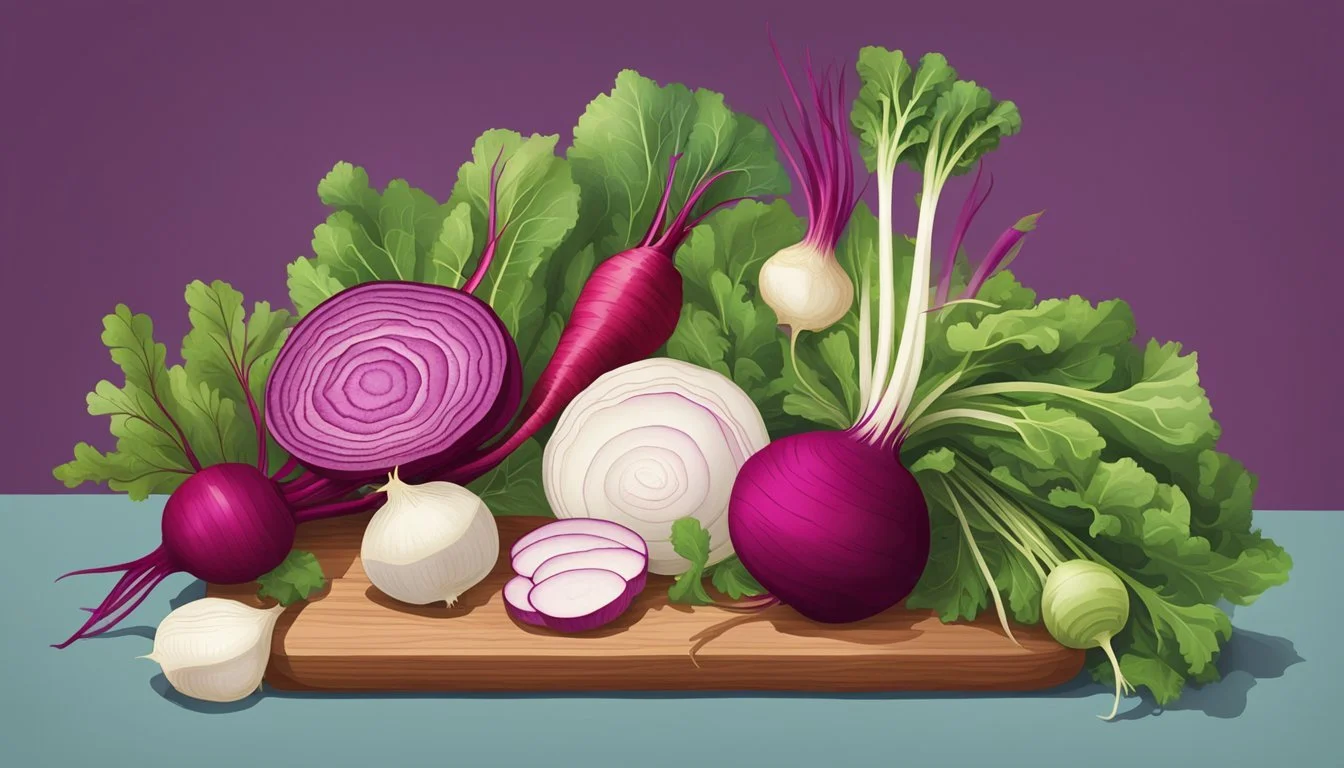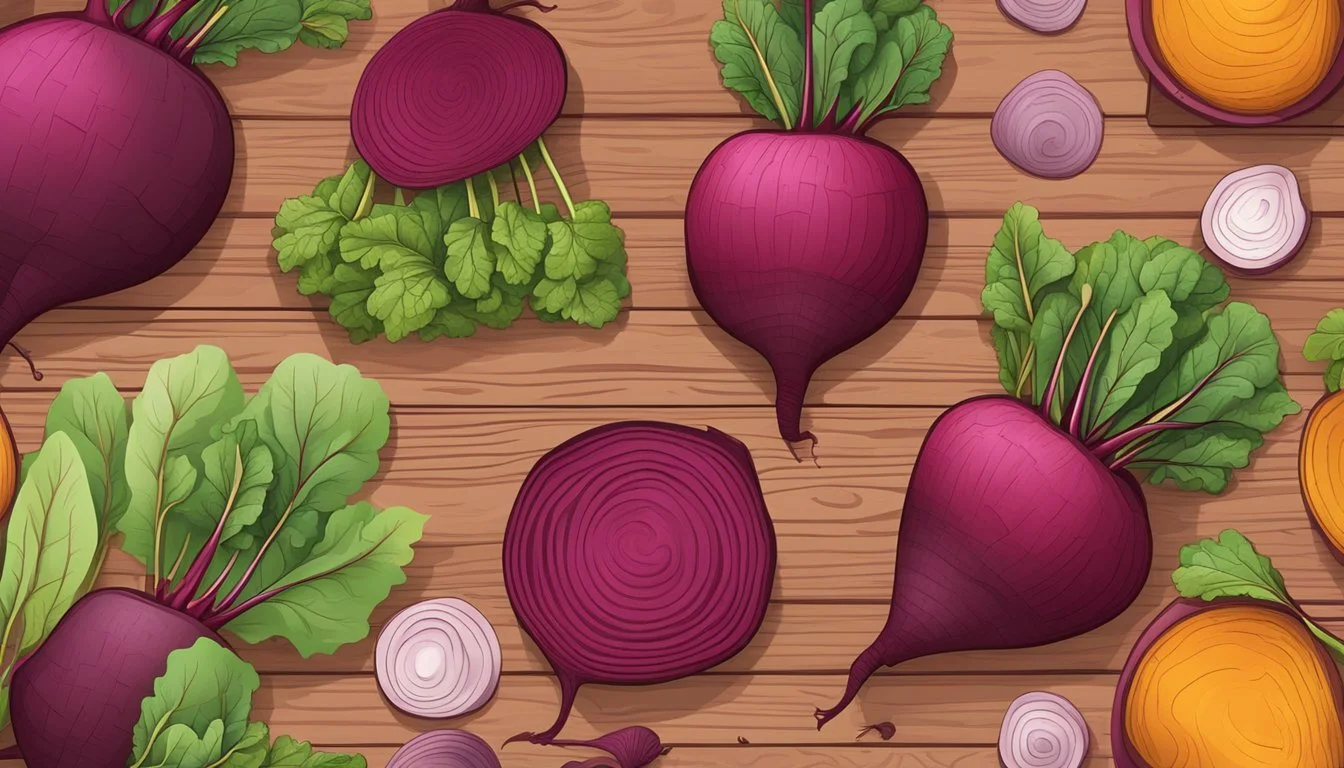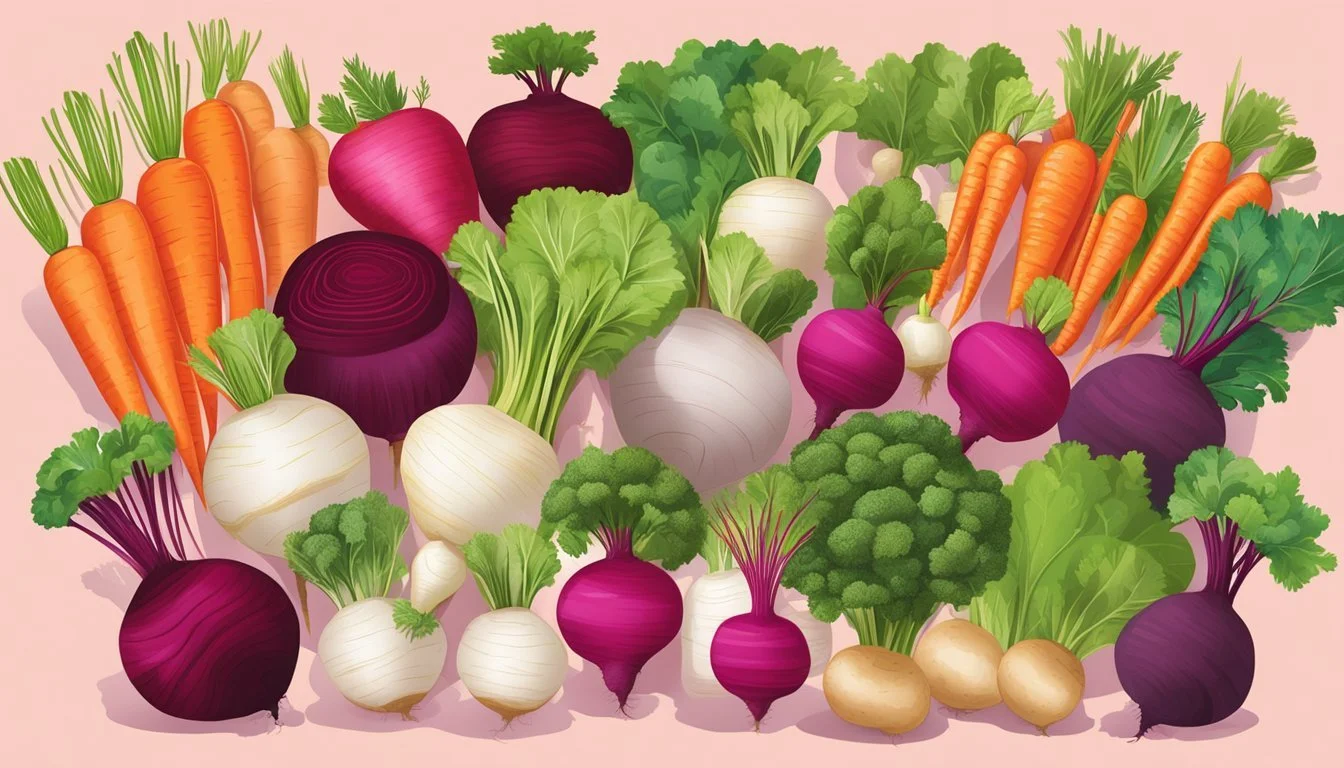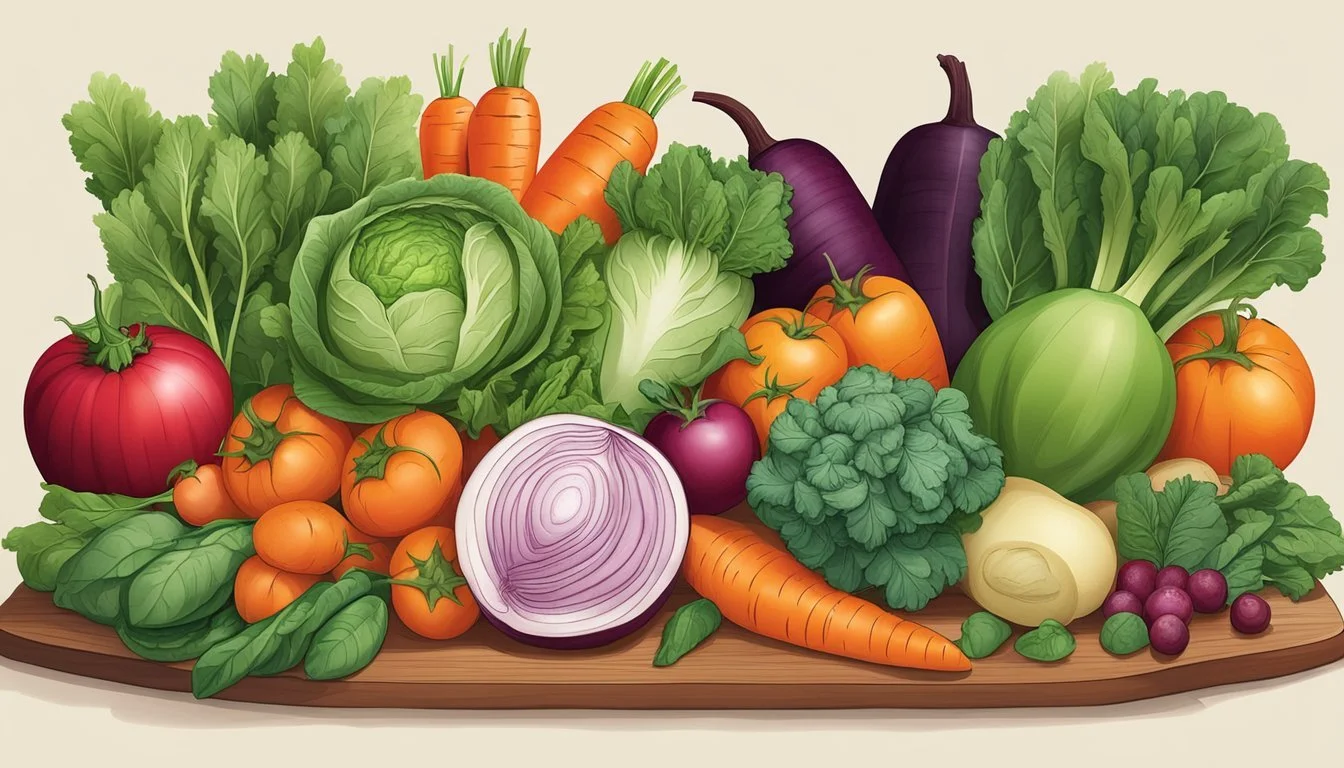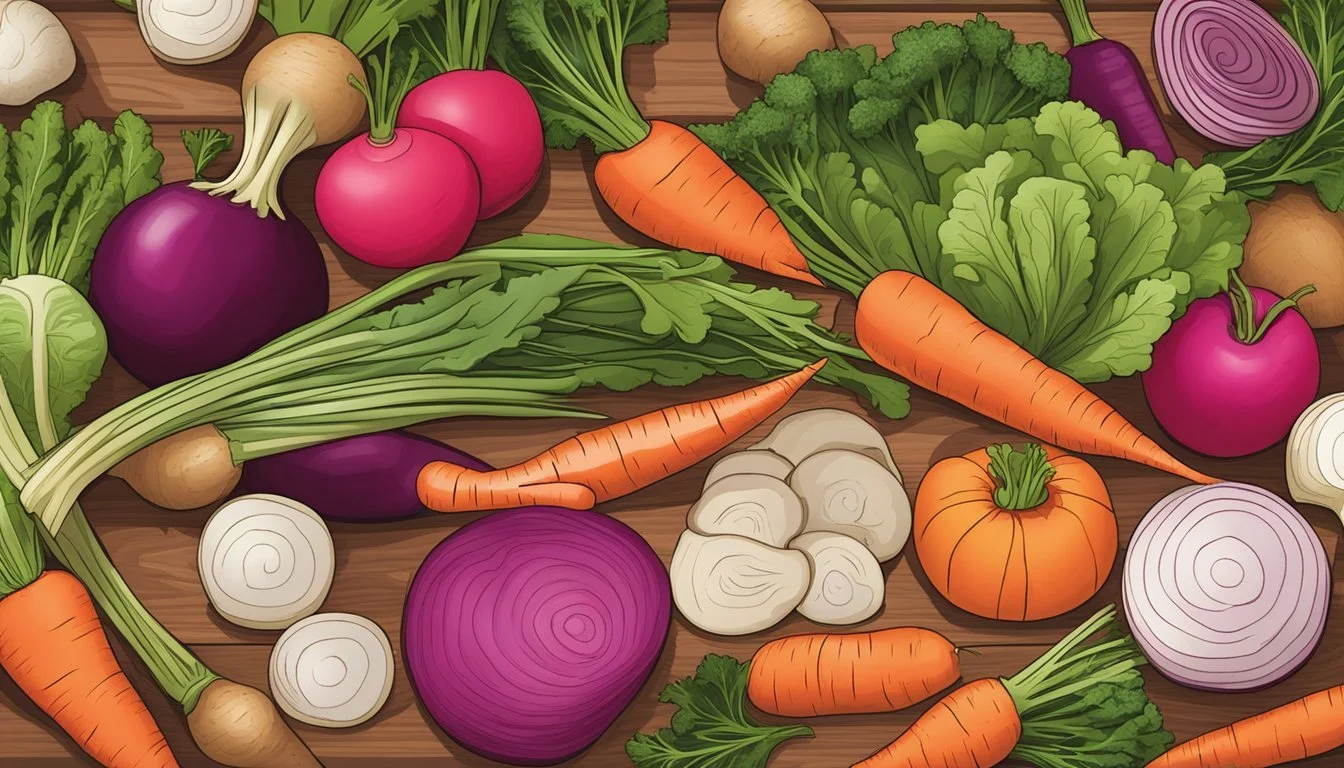Beets Substitutes
Best Alternatives for Your Recipes
Those seeking alternatives to beets in their recipes have numerous options that maintain the health benefits and unique flavors of this root vegetable. For a vibrant color and earthy taste, red cabbage can be used as a reliable substitute. It works well in salads, soups, and various other dishes, making it a versatile choice for those looking to maintain a similar aesthetic appeal.
Sweet potatoes are another excellent option for their natural sweetness and rich texture. Packed with vitamins, minerals, and fiber, sweet potatoes can brighten up meals and work well in bakes or salads. They provide an excellent nutritional profile similar to that of beets, making them a healthy and satisfying alternative.
Lastly, some might turn to beet powder, especially in smoothies. With a less bitter taste and the same nutritional value, beet powder is convenient and long-lasting, providing an easy swap for fresh beets. Whether used in raw snacks or slow-cooked dishes, these substitutes offer variety without compromising on flavor or nutrition.
Nutritional Profile of Beets
Beets are highly nutritious root vegetables loaded with essential vitamins and minerals.
One of the standout components is fiber, which aids in digestion and supports gut health.
Beets are rich in vitamins such as vitamin C and folate. Vitamin C is important for immune function, while folate plays a key role in DNA synthesis and repair.
Minerals found in beets include iron, manganese, and magnesium. Iron is crucial for oxygen transport in the blood, manganese supports bone health and metabolic functions, and magnesium is necessary for muscle and nerve function.
Beets contain antioxidants like betalains, which have anti-inflammatory properties.
A notable feature of beets is their high nitrate content. Nitrates can help improve blood flow and may contribute to lowering blood pressure.
Here's a quick overview:
Nutrient Benefit Fiber Digestive health Vitamin C Immune function Folate DNA synthesis and repair Iron Oxygen transport Manganese Bone health, metabolism Magnesium Muscle and nerve function Antioxidants Anti-inflammatory properties Nitrates Improved blood flow, lower BP
Despite their modest appearance, the nutritional profile of beets makes them a valuable addition to various diets, contributing to overall health and wellness.
Why Substitute Beets?
There are several reasons why someone might look for alternatives to beets. One common reason is the distinct earthy taste of beets, which not everyone enjoys. This flavor can be quite pronounced, making dishes taste almost exclusively of beets.
Another factor is the sweetness that beets add to recipes. While many appreciate this natural sweetness, others may find it overwhelming and prefer a more balanced taste profile.
Texture also plays a role. Beets can be quite firm and dense, which might not be suitable for all culinary applications. When a softer or crunchier texture is needed, a substitution becomes necessary.
Many of the substitutes share the red or purple color of beets, which can be important for the visual appeal of a dish. For example, red cabbage provides a similar vibrant hue and can be used in salads and soups.
Health reasons can also drive the need for beet substitutes. Some individuals may be allergic to beets or need to avoid them due to certain health conditions.
Lastly, substitutes can offer varied health benefits. While beets are rich in nutrients, alternatives like sweet potatoes or carrots can also provide excellent nutritional value, including vitamins and antioxidants.
Beet Substitute Key Similarities Red Cabbage Color, earthy flavors Sweet Potatoes Sweetness, texture, color Carrots Sweetness, earthiness Turnips Mild, slightly bitter Beet Powder Nutritional value
These factors make it clear why someone might choose to explore beet substitutes in their cooking.
Choosing a Beet Substitute
Choosing the right substitute for beets involves considering factors like flavor compatibility, texture, nutritional value, and visual impact to ensure the replacement fits your culinary needs.
Flavor Compatibility
When selecting a beet substitute, the flavor is crucial. Beets offer an earthy flavor with a hint of sweetness. Alternatives like sweet potatoes match the sweetness, though they lack the earthy undertone. Red cabbage provides an earthy flavor and bitterness, making it a suitable option for salads and side dishes. Turnips deliver a mild, pungent taste with a slightly spicy edge, adding complexity to recipes. Each substitute will bring its unique flavor profile, so choose one that complements the other ingredients in your dish.
Texture Considerations
The texture is a significant aspect when replacing beets. Fresh beets are known for their firm, crunchy texture. Carrots and parsnips offer a similar crunch when raw and soften upon cooking. Celeriac is another good option, providing a similarly firm texture while adding a nutty flavor. For soups and smoothies, beet powder can replace fresh beets, though it won't provide the same texture. Evaluating the dish's texture requirements will guide you to select the most appropriate substitute.
Nutritional Similarity
Considering the nutritional profile is vital for making a healthy swap. Beets are rich in vitamins, minerals, and antioxidants. Beet powder offers a concentrated source of nutrients similar to fresh beets. Sweet potatoes are high in vitamins A and C, and fiber, making them a nutritious choice. Turnips and carrots provide fiber and essential vitamins but vary slightly in their nutrient makeup. While substitutes might not match beets' exact nutritional profile, many provide notable health benefits.
Color and Visual Appeal
The vibrant color of beets, whether red or golden, contributes significantly to a dish's visual appeal. Red cabbage can mimic the red color, creating a visually striking presentation similar to beets. Golden beets can be swapped with golden carrots or yellow carrots for a similar hue. For a more subtle visual impact, parsnips offer a pale color but still blend well visually. The chosen substitute should maintain or enhance the dish's aesthetic appeal.
By focusing on these specific criteria—flavor, texture, nutrition, and color—you can select a beet substitute that meets your culinary needs effectively.
Best Beet Substitutes
There are numerous alternatives to beets that can be tailored to specific dishes. Whether preparing salads, soups, stews, roasted dishes, or beverages like smoothies and juices, you'll find a suitable substitute to match the distinct qualities of beets.
For Salads
Sweet Potatoes: Sweet potatoes offer a similar texture and sweetness to raw beets when added to salads. They can be thinly sliced or julienned for a fresh crunch or roasted to enhance their natural sweetness. They're rich in vitamins A and C and can add vibrant color to your greens.
Carrots: Carrots work well in salads due to their sweet and slightly earthy taste. They can be enjoyed raw for a crunchy texture or roasted for a softer, rich flavor. Additionally, they pack a healthy dose of beta-carotene and fiber.
Radishes: For those who prefer a slight peppery kick, radishes are a great choice. Their crisp texture and vibrant red color make them visually appealing in any salad. Radishes can be sliced thinly or grated.
For Soups and Stews
Turnips: Turnips can replace beets in soups and stews. Their slightly bitter and spicy undertone adds a unique flavor. They soften nicely when cooked, making them perfect for slow-simmering dishes.
Parsnips: Parsnips are another excellent option. They bring a sweet, nutty flavor similar to beets. When simmered in soups and stews, parsnips provide a creamy texture that is both hearty and comforting.
Red Cabbage: While not a root vegetable, red cabbage can be added to soups for its color and mild earthy taste. It holds up well during long cooking times and adds a splash of red to the dish.
For Roasting
Butternut Squash: Butternut squash is ideal for roasting. Its natural sweetness becomes more pronounced when roasted, much like beets. Cubes of butternut squash can be seasoned and roasted until golden brown, making a delightful side dish.
Turnips: When roasted, turnips develop a golden, caramelized exterior and a soft, creamy inside. They can be cut into wedges or cubes and combined with herbs for a savory dish that's both nutritious and flavorful.
Celeriac: Celeriac, or celery root, can be roasted to achieve a tender, slightly nutty flavor. Its rough exterior transforms into a delectable roasted vegetable with a texture similar to roasted beets.
For Smoothies and Juices
Carrots: Carrots are a versatile substitute for beets in smoothies and juices. Their natural sweetness enhances the flavor profile, and they blend smoothly. They're packed with vitamins A and K, making them a healthy addition.
Sweet Potatoes: Sweet potatoes can be used in smoothies. When cooked and pureed, they add a creamy texture and subtle sweetness. Their rich nutrient profile makes smoothies both delicious and nutritious.
Red Cabbage: Red cabbage can be juiced to achieve a color similar to beet juice. Its mild flavor pairs well with fruits and vegetables. It also provides beneficial antioxidants and vitamins C and K.
Specific Beet Substitute Suggestions
The following substitutes for beets are excellent in a variety of dishes, offering unique flavors and nutritional benefits. Each option has distinct characteristics, making them ideal for different recipes.
Carrots
Carrots provide a subtly sweet flavor and are rich in beta-carotene, offering a different yet complementary taste compared to beets. They can be roasted, steamed, or added raw to salads. When roasted, carrots caramelize beautifully, adding a natural sweetness to savory dishes. Grated carrots are a versatile addition to soups, stews, and even baked goods like muffins and cakes. Nutritionally, carrots are a great source of vitamins A, K, and C, which promote healthy vision and immune function.
Sweet Potatoes
Sweet potatoes serve as a versatile substitute due to their natural sweetness and similar texture to beets. They can be baked, mashed, or incorporated into salads. The vibrant orange color adds visual appeal to any dish. Sweet potatoes can enhance meals with their high fiber content and abundance of vitamins A and C. They are extremely adaptable, finding their place in both savory dishes like casseroles and sweet treats like pies and puddings.
Parsnips
Parsnips offer a slightly earthy and sweet flavor, making them a suitable alternative to beets. When roasted, they develop a rich caramelization that can enhance soups and stews. Parsnips are best peeled before use and can be cooked similarly to carrots. Nutritionally, they are high in fiber and contain significant amounts of vitamins C and K. Their unique taste pairs well with root vegetable medleys and winter dishes.
Turnips
Turnips bring a mild, slightly bitter flavor with a hint of sweetness, offering a contrast to the earthy taste of beets. They can be eaten raw, roasted, or added to soups. When cooked, turnips soften and absorb surrounding flavors while maintaining a satisfying texture. Turnips are a rich source of vitamins C and B6, and they also provide calcium. They can be sliced thinly for salads or roasted to enhance their natural sugars.
Red Cabbage
Red cabbage shares the vibrant color of beets and provides a crunchy texture when raw. It can be shredded into salads, used in slaws, or added to soups. When cooked, red cabbage maintains its color and adds a subtle sweetness. Nutritionally, it is an excellent source of vitamins C and K, as well as fiber. Red cabbage can also be fermented to create probiotic-rich dishes like sauerkraut.
Swiss Chard and Spinach
Swiss chard and spinach are leafy greens that can substitute for beets, especially beet greens. Swiss chard offers a slightly earthy flavor and can be sautéed, steamed, or used raw in salads. Spinach, milder in taste, provides versatility in cooking and can be added to smoothies, soups, and salads. Both greens are high in vitamins A, C, and K, and they offer significant iron content. These greens enrich dishes with their nutritional profiles and distinctive textures.
Using these substitutes ensures a variety of flavors and colors in your meals, making them both healthy and visually appealing.
Preparing Beet Substitutes
When substituting beets, it's essential to understand the different cooking techniques, how to adjust cooking times, and the best ways to season and spice these alternatives to achieve similar textures and flavors.
Cooking Techniques
Roasting is a popular method for preparing beet substitutes like carrots, sweet potatoes, and turnips. It enhances their natural sweetness and caramelizes their edges. To roast, preheat the oven to 400°F, toss the vegetables in olive oil, spread them evenly on a baking sheet, and roast for 25-30 minutes.
Boiling is effective for root vegetables like parsnips and celeriac. Boil them in salted water until tender, which usually takes 15-20 minutes. Steaming is another option that retains more nutrients compared to boiling. Steam vegetables like red cabbage for about 10-12 minutes until they are crisp-tender.
Adjusting Cooking Times
Different beet substitutes require varying cooking times. For example, carrots and sweet potatoes usually cook faster than beets. When roasting, check for doneness at around 20 minutes by piercing with a fork. If boiling, most substitutes will be tender within 10-15 minutes, but always use a knife or fork to test tenderness.
Steamed vegetables retain more of their texture and nutritional content, making it an excellent choice for alternatives like turnips and red cabbage. Adjust the steaming time to about 10 minutes, ensuring you don’t overcook them, which can make them mushy and less flavorful.
Seasoning and Spices
Choosing the right seasoning is crucial when working with beet substitutes. The earthy flavor of beets can be mirrored by using spices like cumin, coriander, and smoked paprika on substitutes like sweet potatoes and parsnips.
For a spicy kick, add a pinch of cayenne pepper or chili powder to roasted or boiled substitutes. Fresh herbs like rosemary, thyme, and dill pair well with roasted carrots or turnips. When seasoning, consider a drizzle of balsamic vinegar or a squeeze of lemon juice to enhance the natural flavors and add a hint of acidity.
Creative Uses for Beet Substitutes
Sweet potatoes bring vibrant color and sweetness when used in salads, bakes, and more. They are perfect for adding a nutritious boost to your meals. Cut them into cubes and roast until tender for a delightful addition to any salad.
Red cabbage can substitute for beets in soups, stews, and coleslaw. It shares the rich color and earthy flavor. Thinly slice and toss with vinegar and a touch of honey for a quick and delicious coleslaw.
Turnips, with their slightly bitter and spicy undertone, are great for slow cooking or roasting. They also make a healthy snack when eaten raw, paired with a dip. Add diced turnips to your favorite stew recipe for extra texture and nutrition.
Carrots and parsnips can be used in place of beets in many recipes. Their sweet flavors enhance the taste of any soup or stew. Grate them into salads for added crunch and color. Both vegetables also work well when roasted with a mix of herbs.
Beet powder offers convenience and the same nutritional benefits as fresh beets. It blends seamlessly into smoothies and baked goods. Use about ¼ cup beet powder in a smoothie recipe for an easy, nutritious addition.
Celeriac can replace beets in various dishes, providing an earthy flavor and firm texture. Use celeriac in soups, stews, or even mash it as a low-carb alternative to potatoes.
Out-of-Season Alternatives
When fresh beets are out of season, there are several alternatives that can be just as flavorful and nutritious.
Canned Beets offer convenience and a longer shelf life. They retain much of the nutritional content found in fresh beets, making them an excellent substitute. They're perfect for salads, soups, and even smoothies.
Pickled Beets are another great option. They add a tangy twist to dishes. Pickled beets can be found year-round and are versatile enough to be included in both cold and warm dishes.
For a different take, consider Golden Beets and Chioggia Beets. These varieties provide unique flavors and vibrant colors. Golden beets have a milder taste, while Chioggia beets stand out with their striking pink and white rings.
Garden Beets, which include varieties such as white and yellow beets, can sometimes be found canned or pickled. These alternatives share many of the same qualities as red beets.
If the specific flavor of fresh beets is desired, using Beet Powder in recipes such as smoothies can be an effective replacement. It's easy to store and use.
Quick Comparison Table
Substitute Main Benefit Canned Beets Convenience, long shelf life Pickled Beets Tangy flavor, year-round Golden Beets Milder taste Chioggia Beets Unique appearance Beet Powder Easy storage, versatile
These options ensure that one does not have to sacrifice flavor or nutrition even when beets are not in season.
Health Considerations of Beet Substitutes
Substituting beets can still offer various health benefits. Carrots are a good option. They are low in calories and high in fiber. This makes them great for those looking to manage their weight while maintaining digestive health.
Sweet potatoes also make an excellent substitute. They provide natural sugars that can offer a sweet flavor. They are nutritious, containing vitamins A and C, and are rich in fiber.
Red cabbage can work well too. It shares the red color with beets and provides significant antioxidants. Additionally, red cabbage is low in calories, making it a healthy option.
Parsnips bring a unique flavor. They are full of vitamins and minerals such as potassium and vitamin C, contributing to a healthy diet. Parsnips also contain natural sugars and fiber.
Turnips offer another alternative. Like beets, they are nutritious and provide numerous vitamins and minerals. They are also low in calories, which can help in weight management.
Using a variety of these substitutes can help diversify one’s diet. Each of these options brings its own set of health benefits, ensuring that even without beets, meals remain nutritious.
The use of beet powder can be convenient. It retains much of the nutritional value of fresh beets while offering a longer shelf life.
By selecting from these substitutes, it’s possible to enjoy the health benefits typically associated with beets, while also bringing new flavors and nutrients to the table.
Conclusion
Choosing the right beet substitute can elevate a dish while maintaining health benefits. Several vegetables can replace beets effectively.
Root vegetables such as sweet potatoes, parsnips, and turnips offer comparable flavors and nutrition. Sweet potatoes bring vibrant color and a similar texture, while parsnips provide a sweet yet slightly spicy taste. Turnips add a mild, pungent flavor.
For those seeking a color match, red cabbage is another excellent option. It shares the red pigment and earthy flavor, making it suitable for salads, soups, and various recipes.
Beet substitutes are versatile ingredients that fit well in many dishes. They can be roasted, mashed, pureed, or eaten raw, offering flexibility in cooking.
Each substitute contributes unique flavors and textures, ensuring the dish remains flavorful and nutritious. Experimenting with these alternatives can introduce new dimensions to meals, replacing beets without compromising on health or taste.

